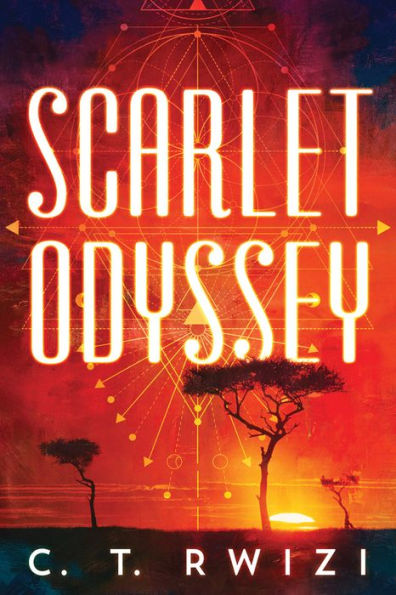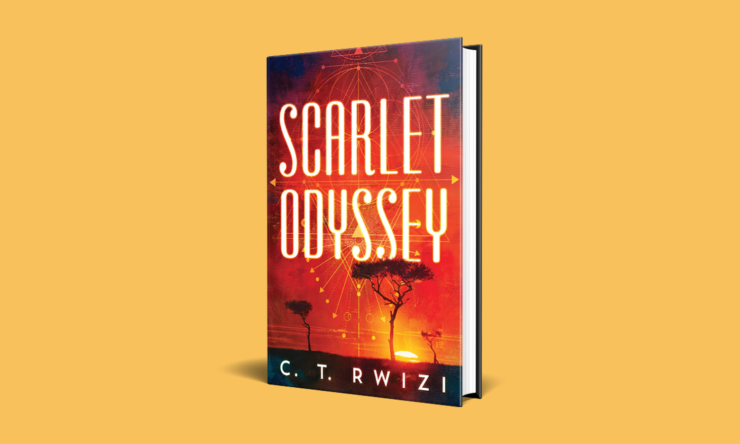A mother who became an obsessive. A boy who became a mystic. A woman who became a warrior. A machine who became a man. A survivor who became an abuser. A princess who became a king. An enemy who became a lover. An ally who became an adversary. The stories of people who defied tradition and social order to live according to their own rules overlap and intertwine in C.T. Rwizi’s commanding new epic fantasy Scarlet Odyssey.
Scarlet Odyssey is told through the eyes of five characters: Musalodi the fledgling mystic; Ilapara the mercenary; Isa the new ruler of the Saire; the Maidservant who reluctantly furthers her master’s plans for a bloody conquest; and the Enchantress who has her own mysterious plans for Umadiland. After the Maidservant attacks his village, Salo awakens his magic against the wishes of his people. His queen sends him on a quest across Umadiland, and along the way he collects Ilapara, who had been working as an underpaid bodyguard, and Tuk, a mechanical man from the lands across the sea.
Meanwhile after Isa’s family is slaughtered in an attack on the Saire palace, she is crowned king and thrust into the middle of a complicated and messy battle for control of her kingdom. Lurking around the edges and causing chaos are the Enchantress, a powerful mystic who seems to delight in destabilizing local politics, and the Dark Sun, who sends the Maidservant and her fellow lieutenants out to terrorize the citizenry before conquering them.
Buy the Book


Scarlet Odyssey
Raised in Swaziland and Zimbabwe but now residing in South Africa, C.T. Rwizi is a remarkable new talent. He deftly juggles five very different protagonists, establishes a vast yet intricate new magical system unlike anything else I’ve ever seen, and unfolds stories scattered across the distant past, the chaotic present, and in entirely different planes of existence. It doesn’t always work—the story doesn’t really get going until about halfway through, several storylines are unnecessary to the plot, and the book doesn’t so much end as simply stop at a convenient point in the narrative—but it is nevertheless impressive.
The language is as rich and dense as a jungle. Rwizi revels in vivid descriptions and long, flowing sentences that will delight hardcore epic fantasy fans and will take a bit of getting used to for dabblers and newbies:
In an ancient temple at the heart of a continent, in a chamber awash with the torpid light of glowing rubies, before an audience of temple votaries, Jasiri guardians, clanspeople, young Sentinels, and a high mystic, a king wears the mask-crown for the first time…The mask-crown is a heavy thing, a moongold artifact enchanted to give its wearer the head of a four-tusked elephant with a lofty crown of spikes…
Contrast that with the sharp action sequences that pack a punch. The battles are bloody and intense. Rwizi’s choice to write in present-tense really pays off in these scenes as it immediately immerses the reader in the fray:
A bolt of red lightning arcs along the blade as it makes contact and cuts him, instantly blackening his flesh. He convulses as he falls, electrocuted by the weapon’s live charm of Storm craft. But this is just the beginning. A militiaman with a long scar on his right cheek steps over him and rushes her with a sword; she holds her spear like a staff, parries two blows, sidesteps a third, lowers her spear, and strikes.
I can see a lot of readers comparing Scarlet Odyssey to Lord of the Rings or A Game of Thrones. Certainly, the book is epic fantasy with a huge cast of characters. There’s a quest for a powerful magical item, court intrigue, political backstabbing, ancient civilizations, fantastical beasts, and battles pitting mortals against supernatural monsters and mages. Rwizi is playing in a very old sandbox, but what he’s created is something wholly new and exciting. Scarlet Odyssey is epic fantasy infused with and reshaped by African mythologies. It feels closer to Marlon James’ Black Leopard, Red Wolf or Charles R. Saunders’ Imaro series than any Eurocentric epics written by white authors.
Frankly, the story’s Medieval African-ness is what made me want to read it in the first place. I don’t generally care for epic fantasy that isn’t young adult fiction. The sprawling narrative, endless quests, and overpopulated and predominantly white cast of characters bring little enjoyment. When I read the description for Scarlet Odyssey, I knew I had to make an exception to my “no adult epic fantasy” rule. And I’m so glad I did. While I wish there were more openly queer characters, a deeper exploration of disability, and fewer fatphobic comments, it was wonderful to sink into a story that acknowledges the diversity of the people inhabiting the continent of Africa. It was brutal and beautiful and bold and Black in every way.
Fans of epic fantasy could hardly go wrong with Scarlet Odyssey. It hits the high marks of the common tropes and avoids the biggest pitfalls. It is thrillingly refreshing, a propulsive story built around a fascinating cast of characters. C.T. Rwizi has built a solid foundation with plenty of room to grow as the series continues. I, for one, can’t wait to see where he takes readers next.
Scarlet Odyssey is available from 47North.
Alex Brown is a teen services librarian by day, local historian by night, author and writer by passion, and an ace/aro Black woman all the time. Keep up with her on Twitter and Insta, or follow along with her reading adventures on her blog.










